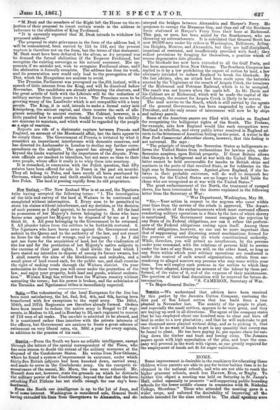ininita. — From the South we have no reliable intelligence, except through
the letters of the special correspondent of the Times, who has seen reason to doubt the extent of the military resources at the disposal of the Confederate States. He writes from New Orleans, where he found a system of impressment in existence, under which thirty-five British subjects had been knocked down, carried away, and made to serve in the Confederate army. On the energetic re- monstrance of the consul, Mr. Mure, the men were released. Mr. Russell does not, however, state the grounds on which he distrusts the military power of the Confederacy, beyond the fact that the force attacking Fort Pickens has not shells enough for one day's bom- bardment.
From the North our intelligence is up to the 1st of June, and is of some interest. Washington is considered safe, General Scott having extended his lines from Georgetown to Alexandria, and de- stroyed the bridges between Alexandria and Harper's Ferry. He proposes to occupy the Manassas Gap, and thus cut off the Southern force stationed at Harper's Ferry from their base at Richmond. This gap, or pass, has been seized by the Southerners, who are throwing up entrenchments. It is calculated that General Scott has now 90,000 men under his orders in Washington, Baltimore, Arling- ton Heights, Monroe, and Alexandria, but they are half-disciplined, impatient of restraint, and insufficiently provided with food ; they collect provisions by foraging for themselves, a practice which of course degenerates into plunder. The blockade has now been extended to all the Gulf Ports, and has been. announced from New Orleans. The Southern Congress has replied to it by a law prohibiting the export of cotton by land, a law obviously intended to induce England to break the blockade. By the last advices, also, an attack had been made upon the batteries erected by the Virginians at the mouth of Acquia Creek, the terminus of the Richmond and Potomac Railroad, which is to be occupied. The result was not known when the mails left. As Mr. Davis and his Cabinet are at Richmond, which will be made the capital of the Confederacy, the contest for Acquia Creek is likely to be severe. The mail service to the South, which is still carried by the agents of the general Government, has been suspended by order of the President, and the only means of intercourse will now be by ships and railway parcels.
Some of the American papers are filled with attacks on England for recognizing the belligerent rights of the South. The Tribtene, for example, asks how England would like such recognition were Scotland in rebellion, and every public letter received in England ad- verts to the bitterness of American feeling on the point. A writer in the New York Commercial Advertiser shows, however, that this feeling is not universal. He says :
"The principle of treating the Secession States as belligerents re- lieves the United States from reclamations for lawless acts, under Secession auspices, upon British property. If Great Britain allows that Georgia is a belbgerent and at war with the United States, the latter cannot be held accountable for insults to British ships and mariners in the ports of that revolted State, or for robberies on the high seas by Secession cruisers. Against .them England, if she be- lieves in their probable existence, will do well to despatch her cruisers, for the United States are no longer to he held liable for those who are recognized as at war with the United States." The great embarrassment of the North, the treatment of escaped slaves, has been terminated by the decree explained in the following letter from the Secretary at War: War Department, Washington, May 30.
" Sir,—Your action in respect to the negroes who came within your lines from the service of the rebels is approved, The depart- ment is sensible of the embarrassments which must surround officers conducting military operations in a State by the laws of which slavery is sanctioned. The Government cannot recognize the rejection by any State of its Federal obligations, nor can it refuse the perform- ance of the Federal obligations resting upon itself. Among these Federal obligations, however, no one can be more important than that of suppressing and dispersing armed combinations formed for the purpose of overthrowing its whole constitutional authority. While, therefore, you will permit no interference, by the persons under your command, with the relations of persons held to service under the laws of any State, you will, on the other band, so long as any State within which your military operations are conducted is under the control of such armed organizations, refrain from sur- rendering to alleged masters any persons who may come within your lines. You will employ such persons in the service to which they may be best adapted, keeping an account of the labour by them per- formed, of the value of it, and of the expense of their maintenance. The question of their final disposition will be reserved for future de-






























 Previous page
Previous page